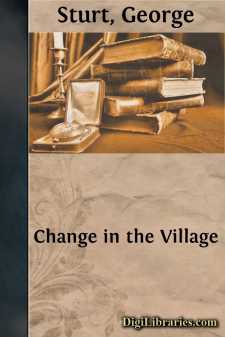Categories
- Antiques & Collectibles 13
- Architecture 36
- Art 48
- Bibles 22
- Biography & Autobiography 813
- Body, Mind & Spirit 142
- Business & Economics 28
- Children's Books 14
- Children's Fiction 11
- Computers 4
- Cooking 94
- Crafts & Hobbies 4
- Drama 346
- Education 46
- Family & Relationships 57
- Fiction 11829
- Games 19
- Gardening 17
- Health & Fitness 34
- History 1377
- House & Home 1
- Humor 147
- Juvenile Fiction 1873
- Juvenile Nonfiction 202
- Language Arts & Disciplines 88
- Law 16
- Literary Collections 686
- Literary Criticism 179
- Mathematics 13
- Medical 41
- Music 40
- Nature 179
- Non-Classifiable 1768
- Performing Arts 7
- Periodicals 1453
- Philosophy 64
- Photography 2
- Poetry 896
- Political Science 203
- Psychology 42
- Reference 154
- Religion 513
- Science 126
- Self-Help 84
- Social Science 81
- Sports & Recreation 34
- Study Aids 3
- Technology & Engineering 59
- Transportation 23
- Travel 463
- True Crime 29
Change in the Village
by: George Sturt
Description:
Excerpt
THE VILLAGE
If one were to be very strict, I suppose it would be wrong to give the name of "village" to the parish dealt with in these chapters, because your true village should have a sort of corporate history of its own, and this one can boast nothing of the kind. It clusters round no central green; no squire ever lived in it; until some thirty years ago it was without a resident parson; its church is not half a century old. Nor are there here, in the shape of patriarchal fields, or shady lanes, or venerable homesteads, any of those features that testify to the immemorial antiquity of real villages as the homes of men; and this for a very simple reason. In the days when real villages were growing, our valley could not have supported a quite self-contained community: it was, in fact, nothing but a part of the wide rolling heath-country—the "common," or "waste," belonging to the town which lies northwards, in a more fertile valley of its own. Here, there was no fertility. Deep down in the hollow a stream, which runs dry every summer, had prepared a strip of soil just worth reclaiming as coarse meadow or tillage; but the strip was narrow—a man might throw a stone across it at some points—and on either side the heath and gorse and fern held their own on the dry sand. Such a place afforded no room for an English village of the true manorial kind; and I surmise that it lay all but uninhabited until perhaps the middle of the eighteenth century, by which time a few "squatters" from neighbouring parishes had probably settled here, to make what living they might beside the stream-bed. At no time, therefore, did the people form a group of genuinely agricultural rustics. Up to a period within living memory, they were an almost independent folk, leading a sort of "crofter," or (as I have preferred to call it) a "peasant" life; while to-day the majority of the men, no longer independent, go out to work as railway navvies, builders' labourers, drivers of vans and carts in the town; or are more casually employed at digging gravel, or road-mending, or harvesting and hay-making, or attending people's gardens, or laying sewers, or in fact at any job they can find. At a low estimate nine out of every ten of them get their living outside the parish boundaries; and this fact by itself would rob the place of its title to be thought a village, in the strict sense.
In appearance, too, it is abnormal. As you look down upon the valley from its high sides, hardly anywhere are there to be seen three cottages in a row, but all about the steep slopes the little mean dwelling-places are scattered in disorder. So it extends east and west for perhaps a mile and a half—a surprisingly populous hollow now, wanting in restfulness to the eyes and much disfigured by shabby detail, as it winds away into homelier and softer country at either end. The high-road out of the town, stretching away for Hindhead and the South Coast, comes slanting down athwart the valley, cutting it into "Upper" and "Lower" halves or ends; and just in the bottom, where there is a bridge over the stream, the appearances might deceive a stranger into thinking that he had come to the nucleus of an old village, since a dilapidated farmstead and a number of cottages line the sides of the road at that point....


